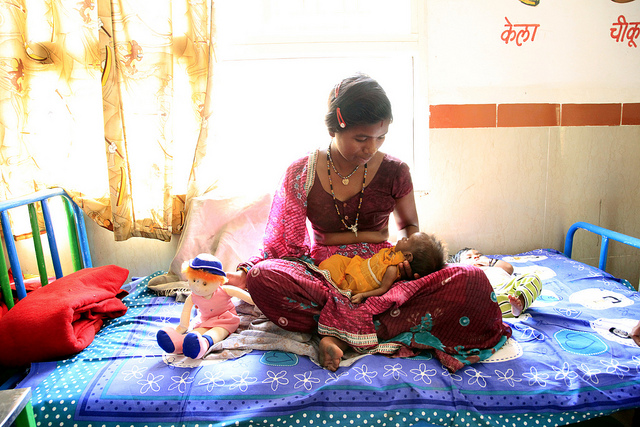In a new paper, published in the Journal of International and Comparative Social Policy, Dr Jasmine Gideon argues that despite their current popularity, Public-Private Partnerships need to be reviewed through a gender lens in order to establish whether they are really enabling the health sector to address wider social determinants of health and to ensure the longer-term success of any pro-women healthcare interventions.
Good health and sustainable development are widely acknowledged to be inextricably linked, and the promotion of health and well-being is an essential element in the Sustainable Development Goals (SDGs). Within SDG3, ‘Ensure healthy lives and promote wellbeing for all at all ages’, governments have pledged to ensure universal access to sexual and reproductive health (SRH) care services by 2030.
One of the approaches often cited as necessary to provide universal access is through Public-Private Partnerships (PPPs) in health. The term PPP has been used in a variety of different contexts, but in the case of delivery of SRH services, PPPs have been used to fund and implement social franchising and health care voucher programmes in the Global South. They typically tie the recipient to a specified good or service package, such as medical consultations during pregnancy, provided by specified service providers who are often private practitioners or private sector facilities. The approaches have grown in popularity since 2000 because:
- they have been promoted by a range of aid donors including DFID and USAID
- they are relatively easy to administer and to measure and monitor,
- they are considered to be a way of encouraging poor households to use services e.g. family planning that they would not otherwise access.
However, there is criticism about the lack of evidence to sustain the claims made about the effectiveness of PPPs in improving access to health care services, and a recent paper by Benjamin M. Hunter, Susan F. Murray and I has argued that such PPPs may do little to address gender inequalities in health. We highlight the need to apply a ‘gender lens’ to the debate around the effectiveness of PPPs in SRH. We propose three key questions that should be asked of all PPP programmes to determine whether issues of gender inequality have been considered:
- What are the assumptions underpinning agendas in SRH-PPP interventions?
- How are SRH-PPP programmes framed and judged?
- To what extent do the SRH-PPP interventions take into account, reinforce or confront the existing realities of gendered social and economic life?
Applying these questions to a case study of a voucher scheme in India, we found that the design of the voucher programme was based on an assumed relationship between use of formal healthcare and decreased mortality and fertility, and the assumed superior effectiveness of private healthcare ‘markets’. The programme was framed as ‘innovative’ yet programme documents indicate the emphasis was on demonstrating rather than testing vouchers as a healthcare delivery model, and claims of success were made based on changes in healthcare use that were not adjusted for government programmes running concurrently.
The scheme in India did little to confront gender norms and values that are deeply embedded within health systems as well as the households that interact with them. For example despite the claims in programme documents to give pregnant women a choice of facility where they wish to give birth, in reality the decision was made by a husband, mother-in-law, female community health worker or the worker’s male supervisor.
The case study also shows that while PPPs claim to address gender-based inequalities, they do so within a limited framework whose simplistic focus on the gaps in women’s health fails to consider the socially constructed relations between men and women. Such PPPs therefore become part of a wider trend of interventions that have contributed to the depoliticization of women’s health and instead maintain a simplistic focus on maternal health that ignores the gendered power relations.
We argue that despite their adoption as the buzzwords of the moment it is not clear that PPP arrangements move us closer towards the ability of the health sector to address the wider social determinants of health that are critical to ensuring the longer-term success of any pro-women healthcare intervention. Applying a gender lens to review the evidence is one way that we can move closer to this goal.
Further information:
- ‘Public-private partnerships in sexual and reproductive healthcare provision: establishing a gender analysis‘ in Journal of International and Comparative Social Policy, Volume 33, 2017, Issue 2
- Dr Jasmine Gideon
- Department of Geography
- Courses in international development
- Research at Birkbeck



 ‘All they want is my money.’ This is the most common rejoinder from participants in a UK nationwide study carried out between 2011 and 2014 by Birkbeck and LSE on public attitudes towards humanitarian and international development issues and responses to humanitarian communications.
‘All they want is my money.’ This is the most common rejoinder from participants in a UK nationwide study carried out between 2011 and 2014 by Birkbeck and LSE on public attitudes towards humanitarian and international development issues and responses to humanitarian communications.